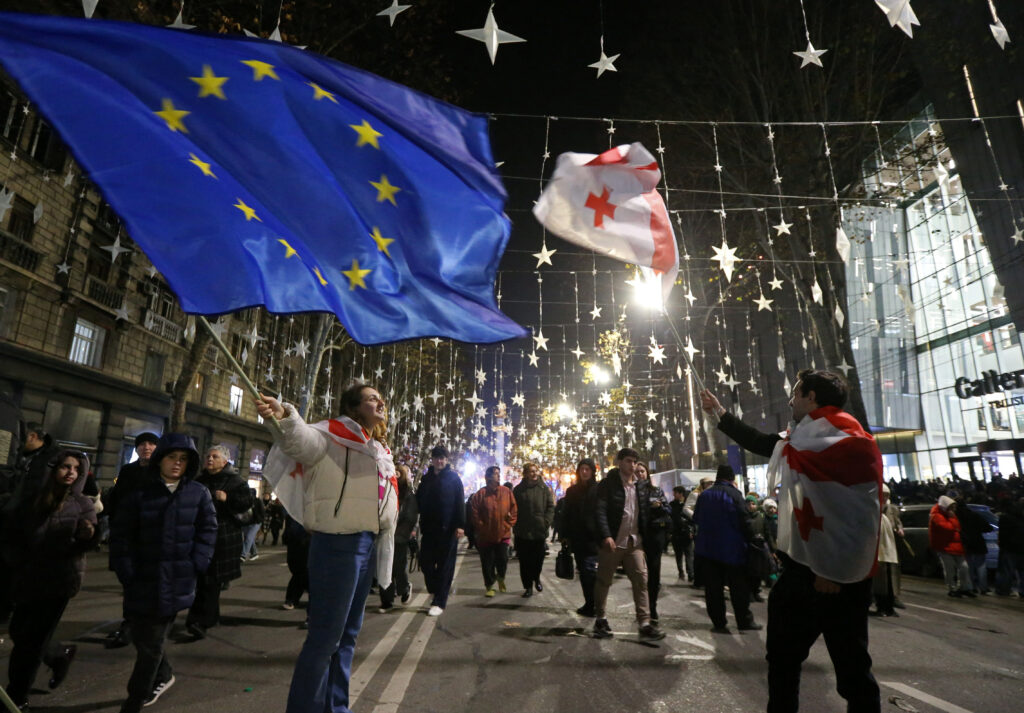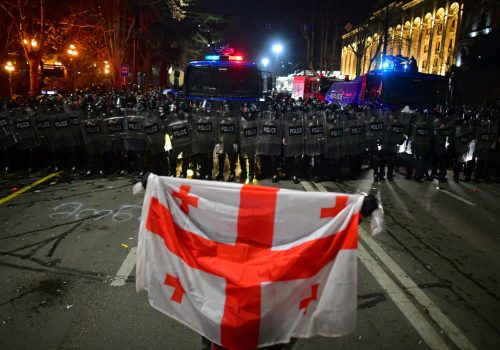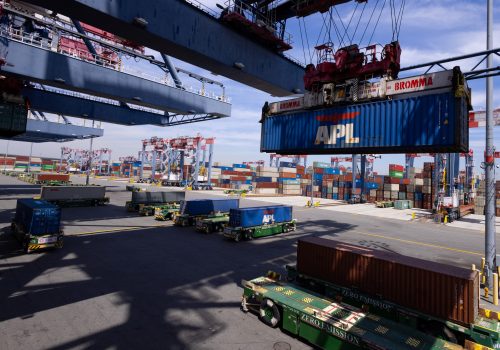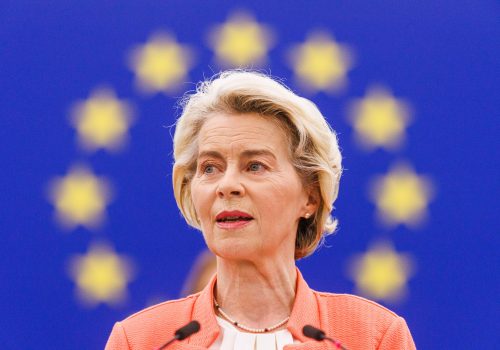Georgia sits outside the European Union (EU) despite Georgians overwhelmingly supporting a Euro-Atlantic future. In 2022, a poll by the International Republican Institute found that 85 percent of Georgians wanted their country to join the EU, while Georgia’s constitution codifies EU and NATO membership as national priorities. Georgian ambitions received a boost in December 2023, when the country was granted EU candidate status, even as EU concerns about Georgia’s record on rule of law and an entrenched oligarchy remain obstacles to full membership.
Western partners and Georgian policymakers must now intensify their efforts to shape the conversation and push for progress in Georgia’s Euro-Atlantic accession, especially ahead of the Georgian parliamentary elections expected in October. Given Russia’s preoccupation with its invasion of Ukraine, Georgian officials should recognize the diminished threat from Russia to Georgia’s westward ambitions and the Georgian public must be encouraged to hold their government accountable to reform. This will not be easy when the sincerity of the Georgian government’s commitment to EU integration is in question.
Receding Russia
Russia is the greatest hurdle dissuading Euro-Atlantic integration in Georgia. In 2008, following a promise by NATO to bring Georgia into the Alliance in the future, Russia acted quickly to block Georgia’s integration with the West through invasion. As Georgia lacked Western security guarantees, the country was left alone to fend off a Russian invasion, resulting in the occupation of South Ossetia and Abkhazia. Ever since, Georgian politicians have toed carefully between the country’s pro-European sentiments and appeasing any possible security threats from Moscow.
However, recent developments lend little credibility to suggestions that Georgia must forgo EU integration to ensure its security. Since the onset of war in Ukraine, Russia withdrew more than two thousand troops from Georgia’s breakaway regions, while also failing to intervene in recent fighting between Armenia and Azerbaijan. These trends indicate that the South Caucasus no longer constitute a top political priority for the Kremlin when compared with its ongoing invasion of Ukraine. Even Moldova, threatened by a Russian presence in the breakaway region of Transnistria, became an EU candidate in June 2022 with no major military repercussions from Moscow.
Threats to Georgia remain, however, with particular regard to Russia’s growing Black Sea naval presence. Though security concerns must be taken seriously, it is not clear that the threats to Georgia are greater than to other countries in the region that already pursue a strong westward course. Western policymakers must bear these concerns in mind when pushing for reform in Georgia, while not allowing security to excuse Tbilisi of engaging with reform.
With Russia ultimately preoccupied in Ukraine, this then raises the question of whether Tbilisi’s hesitancy toward reform truly stems from security threats from Moscow or from a deeper hesitation by powerful voices within Georgia.
Georgian Dream vs. Georgia’s European dream
Despite its official commitments to Europe, analysts question whether the commitments of the ruling Georgian Dream party toward European accession are genuine, or a ploy aimed at appeasing the pro-European sentiments of the Georgian populous.
Bidzina Ivanishvili, Georgian Dream’s founder and first prime minister, wields considerable influence over the party. Despite his term as prime minister ending in 2012, Ivanishvili’s reported control of 20 percent of Georgia’s economy and immense political influence cause experts to argue that he maintains a sizable role within Georgian Dream. Ivanishvili, having made his fortune in Russia during the 1990s, has been accused of holding pro-Russian views to benefit his business dealings, explaining his drive to normalize relations with Moscow and his kowtowing to Russia in setting the scope of Georgia’s foreign policy. Furthermore, EU recommendations to combat oligarchy and reduce political polarization in Georgia seem to run contrary to the interests of Ivanishvili and his party.
If Georgian Dream’s commitments to EU accession are indeed disingenuous, Euroskeptic administrations in other accession candidate countries offer a roadmap in deflecting blame for stalled reforms and working to diminish popular support to join the EU. Since applying for accession in 2009, Serbia has stalled on its reforms, and backslid on media freedom and rule of law. As a result, public support in Serbia to join the EU has dropped from 65 percent in 2009 to just 33 percent in 2022. In 2023, the Serbian government openly expressed its skepticism, with President Aleksandar Vučić remarking that Serbia is “pessimistic” about EU accession while arguing that the EU appeared unenthusiastic about Serbia’s integration.
With Georgian Dream’s similarly questionable commitments to EU integration, Western officials must engage intensively to prevent Georgia from reaching a similar fate.
The moment for action
First, the Georgian public must understand that Russia poses a diminished threat and cannot be blamed for government failures. Though Russia’s security threat to Georgia has clearly receded, expanding military cooperation with NATO might further affirm Georgia’s security while discrediting misleading narratives that Georgian Dream proliferates among the public. However, any military or financial support must be conditioned on sustained progress toward reform.
Second, the EU must remain visibly engaged with Georgia’s progress so political opportunists cannot place blame for slow progress on the West. Working closely with civil society and independent media, Western observers must develop a comprehensive public diplomacy strategy to maintain popular support for EU integration, while offering reporting of Georgia’s reform progress to the Georgian public and Western officials. This will be crucial in the lead-up to the 2024 parliamentary elections, where Georgian Dream’s undermining of reform can be challenged by the opposition and grassroots organizers.
Georgians have demonstrated unquestionable capacity to influence government policy through peaceful mass mobilization during the 2003 Rose Revolution and the more recent protests in March 2023 which brought about the failure of a “foreign agent” law that ran contrary to European Commission recommendations. Furthermore, with growing concerns that the 2024 elections may be subject to meddling by Georgian Dream, the need for consolidated pro-reform opposition only becomes more apparent. If opposition parties, civil society, and media cooperate with international observers to strengthen popular pressure in the lead-up to the elections, then Georgian Dream will have to make the decisive choice to embrace voters’ Euro-Atlantic aspirations. Otherwise, Georgian Dream will suffer the backlash, either in the voting booth or on the streets.
Jacob Paquette is a program associate for Freedom House’s Europe & Eurasia Program. He is a former young global professional with the Atlantic Council’s Europe Center and a recent graduate from American University’s School of International Service.
Further reading
Thu, Aug 31, 2023
Russia is losing in Ukraine but winning in Georgia
UkraineAlert By
If Putin is able to reassert Russian dominance over Georgia while continuing to occupy 20% of the country, he will be encouraged to believe that a similar outcome will eventually prove possible in Ukraine, writes Giorgi Kandelaki.
Wed, Oct 18, 2023
Designing a US-EU industrial and trade policy
Issue Brief By
Both sides of the Atlantic are confronting the geopolitical necessity of adapting trade and industrial policies to be fit for purpose in an increasingly competitive world. To avoid competition between Washington and Brussels, policymakers must recognize each side’s priorities and commit to further cooperation to bridge the transatlantic economic relationship, not widen it.
Thu, Sep 14, 2023
Reading between the lines of Ursula von der Leyen’s ambitious vision for the EU
New Atlanticist By
The European Commission president delivered her annual speech on the state of the European Union on September 13 in Strasbourg.
Image: People attend a rally to celebrate the European Council's decision to grant Georgia European Union candidate status, in Tbilisi, Georgia December 15, 2023. REUTERS/Irakli Gedenidze



